Former Principal Investigators
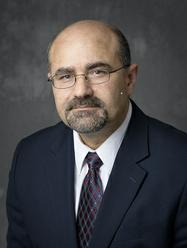
| Dr. Anter El-Azab Purdue University Dr. Anter El-Azab is a professor of Materials Engineering (and Nuclear Engineering by courtesy) at Purdue University. His research interests focus on materials defects and microstructure. He is a theorist that currently works on dislocation dynamics and mesoscale plasticity, defect disorder and radiation effects in metals and oxides, grain growth and recrystallization, and microscopic and mesoscopic theory of thermal transport in crystalline solids. Part of his research (with his students, postdocs and collaborators) focuses on the development of computational methods in mechanics and materials science and on confronting mesoscale models of materials with experiments. As a member of TETI, Dr. El-Azab will coordinate the team's effort on modeling of the phonon and electron transport using the Boltzmann Transport Equation (BTE) approach and the connection of BTE models with 5f electron electronic structure models models and experiments of phonon and electron scattering physics. He and his group will work on modeling of thermal transport in Th1-xUxO2 and UZr systems and on defect and microstructure self-organization and the role of defects and microstructure in phonon and electron scattering.
| |
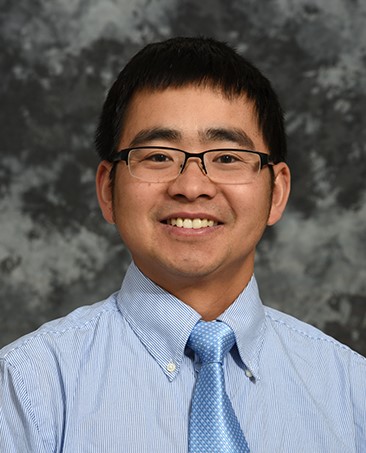
| Dr. Lingfeng He Formerly Idaho National Laboratory (now at North Carolina State University) Dr. Lingfeng He is an associate professor of Nuclear Engineering at North Carolina State University. Previously, he was a distinguished staff scientist and High-Resolution Materials Characterization (HRMC) group lead at Idaho National Laboratory (INL), where he mainly worked on microstructural characterization of as-fabricated and irradiated nuclear fuels and materials. Dr. He is interested in materials behavior under extreme environments, with a focus on environmental degradation of materials in nuclear power systems. His goal is to understand how the processing and radiation/corrosion environments change the microstructure of materials and their effects on the mechanical and thermal properties of materials. He probed these interactions by virtue of cutting-edge electron microscopy and spatially resolved spectroscopy techniques. Dr. He received a Ph.D. in Materials Science at the Chinese Academy of Sciences in 2009. He worked as a post-doctoral research associate and assistant scientist at Nagaoka University of Technology in Japan and the University of Wisconsin-Madison before joining INL in 2014. He is the recipient of INL Laboratory Director's 2020 Exceptional Scientific Achievement Award.
|
|
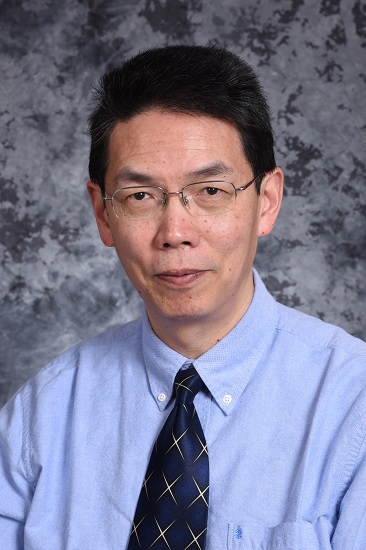
| Dr. Jian Gan Idaho National Laboratory Dr. Jian Gan is a Directorate Fellow and department manager of the Advanced Characterization at Idaho National Laboratory's Materials and Fuels Complex. He has been dedicated to conducting radiation effects research leading to the development of radiation-tolerant materials for 25 years. He has extensive experience using multiple techniques such as light ions, heavy ions, in-situ ion irradiation/microscopy and neutron irradiation to conduct research focused on the relationships between radiation damage, material microstructure and material performance on a broad range of reactor structural materials and nuclear fuels. In addition to this effective multidisciplinary approach, Dr. Gan is a recognized international expert in the nanoscale characterization of irradiated fuels and materials using transmission electron microscopy (TEM). Before joining Argonne National Laboratory-West in 2002, he did his post-doctoral fellowship at Pacific Northwest National Laboratory in 1999-2001. He was an assistant professor (1982-1987) and a lecturer (1987-1990) in Physics Department of Fudan University. He has been working as principle researcher and work package manager for many DOE projects and he is a member of the Organization for Economic Co-operation and Development - Nuclear Energy Angency (OECD-NEA) Expert Group on Innovative Structural Materials.
| | 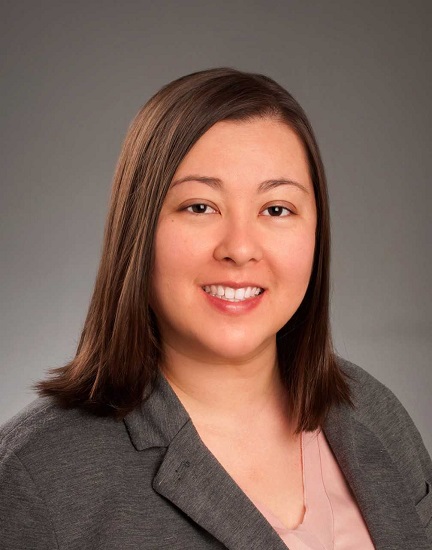
| Dr. Janelle Wharry Purdue University Dr. Janelle Wharry is an assistant professor in the School of Nuclear Engineering at Purdue University, and holds a courtesy appointment in the School of Materials Engineering. Dr. Wharry is an expert on microstructure, characterization, and nano- and micro-mechanics of irradiated metals and alloys. She has pioneered the use of transmission electron microscopy in situ quantitative mechanical testing for irradiated alloys. In addition, Dr. Wharry received a Department of Energy contract to code-qualify structural alloys produced by powder metallurgy and hot isostatic pressing for irradiation-facing components in nuclear power plants. She has mentored nine graduate students and more than 30 undergraduate researchers, and she has published more than 40 peer-reviewed journal articles and conference papers. Dr. Wharry is a recipient of the National Science Foundation CAREER Award, ORAU Ralph E. Powe Junior Faculty Award and TMS Young Leader Professional Development Award. She is tgeneral chair of the 2019 Materials in Nuclear Energy Systems (MiNES) Conference, chair of American Society for Testing and Materials (ASTM) Subcommittee E10.08 on Procedures for Radiation Damage Simulation, and former chair of the American Nuclear Society (ANS) Materials Science & Technology Division. She received her Ph.D. from the University of Michigan in 2012.
| | 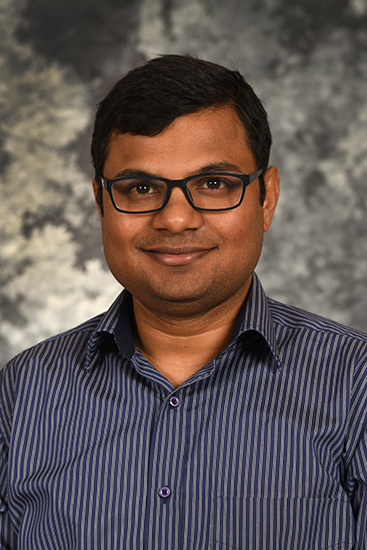
| Dr. Mukesh Bachhav Idaho National Laboratory Dr. Mukesh Bachhav is staff scientist in the Advanced Characterization department, and is instrument lead for Atom Probe Tomography for analyzing nuclear fuels and structural materials for elucidating microstructural changes. Previously, he worked as a research assistant at University of Michigan, Ann Arbor for four years, focusing on structural-property correlation for irradiated materials using high-resolution techniques. He joined University of Michigan after getting his Ph.D. in materials science at University of Rouen in 2013 where he worked on elucidating metal oxides for quantitative analysis using Atom Probe Tomography. His current research focuses on understanding and quantifying the mechanisms controlling microstructural evolution in structural materials and nuclear fuels, interfacial properties, oxidation behavior and irradiation effects in materials. To complement his experimental work, he is also collaborating with groups in computational and theoretical materials science.
| |
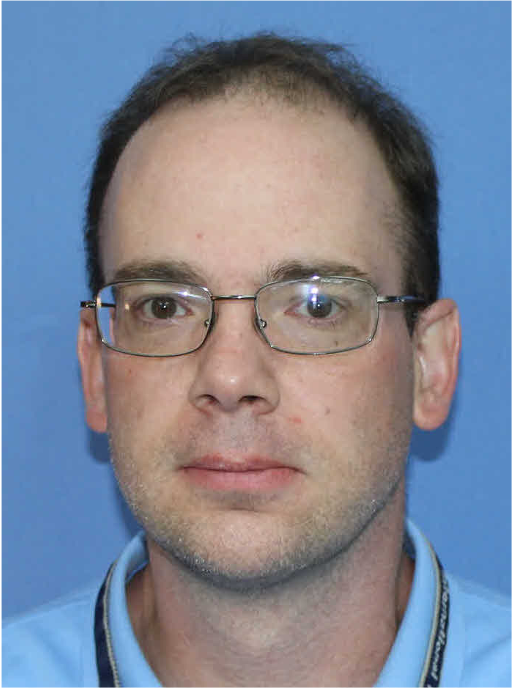
| Dr. Michael Benson Idaho National Laboratory Dr. Michael Benson is a distinguished staff scientist at Idaho National Laboratory in the Advanced Fuel Manufacturing & Development department.
| | 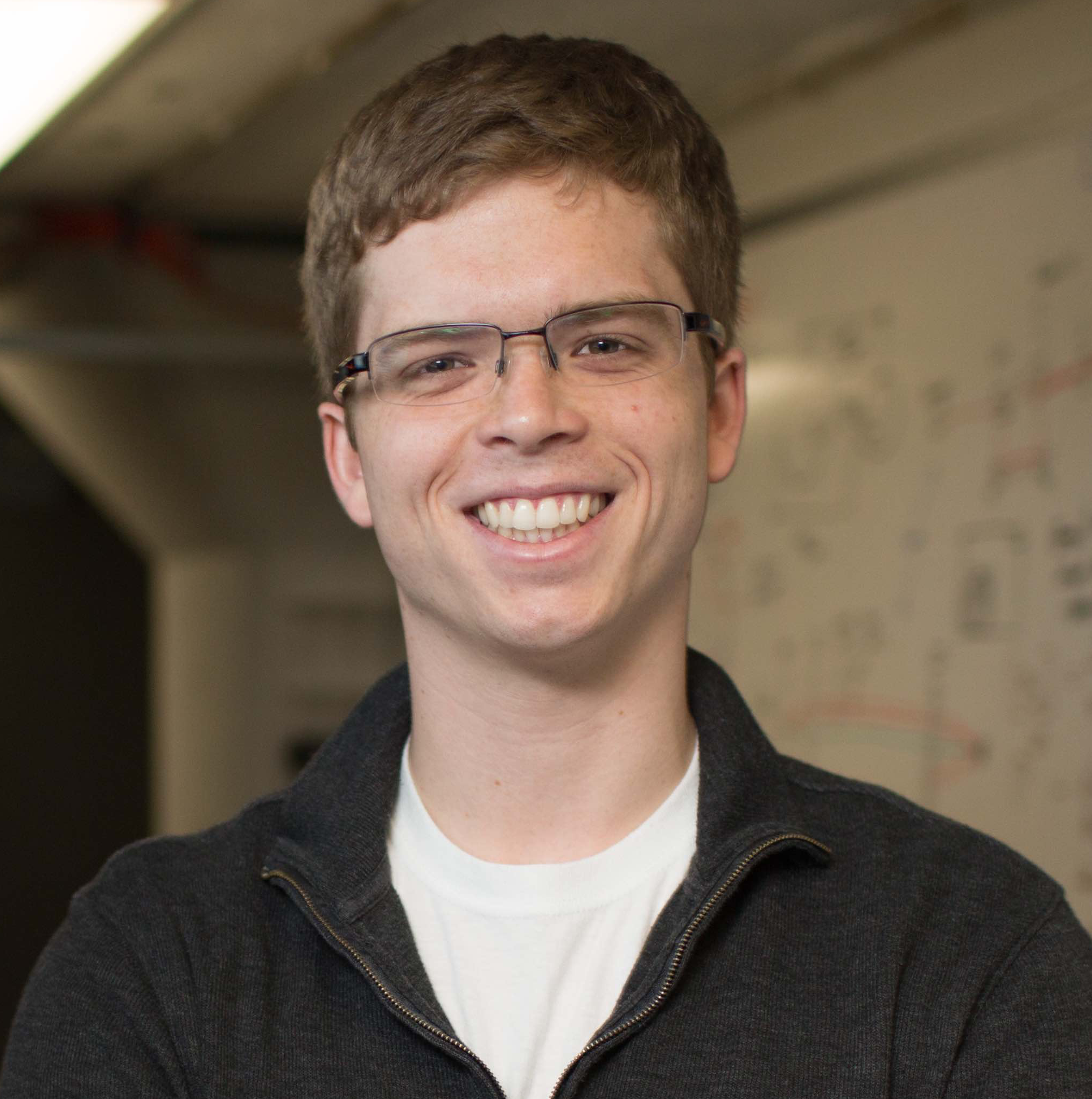
| Dr. Cody Dennett Idaho National Laboratory Dr. Cody A. Dennett was an Applied Physicist in the Condensed Matter and Materials Physics Group at Idaho National Laboratory, and prior to that, was a Russel L. Heath Distinguished Postdoctoral Research Associate in the Materials Science and Engineering Department at INL. Dr. Dennett's research focuses on developing laser-based techniques to measure thermomechanical material properties during exposure to extreme conditions such as temperature and radiation. He is using these techniques to study the performance of advanced structural alloys and nuclear fuels and surrogates under these extremes. He earned his Ph.D. in Nuclear Science and Engineering in 2019 from the Massachusetts Institute of Technology. During that time, he was a National Science Foundation Graduate Research Fellow from 2014-2016 and a DOE National Nuclear Security Administration Stewardship Science Graduate Fellow from 2016-2019. In addition to his research, Dr. Dennett is passionate about teaching and modeling effective scientific communication, having served as a School of Engineering Communication Fellow at MIT from 2015-2019.
| |
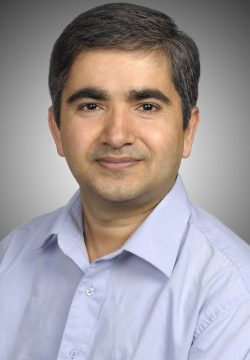
| Dr. Madhab Neupane University of Central Florida Dr. Neupane received his Ph.D. in physics from Boston College in 2010.
He spent four years (2011-2014) as a postdoctoral research associate at
Princeton University and one year (2015-2016) as a Director's Fellow at Los
Alamos National Laboratory. He joined the University of Central
Florida in 2016 where he is currently an assistant professor. Dr.
Neupane's research focuses on advanced spectroscopic characterization of
correlated materials as well as topological quantum materials. In particular,
he utilizes angle-, spin- and time-resolved photoemission measurement
techniques to reveal interesting electronic and spin properties, as well as the
momentum resolved dynamical properties of the materials.
| | Former Postdoctoral Researchers and Graduate Students
| |

| Dr. Tiankai Yao, Postdoctoral Research Associate Idaho National Laboratory Dr. Tiankai Yao received his Ph.D. in Nuclear Science & Engineering from Rensselaer Polytechnic Institute, Troy, NY, in 2017. He also has a Master of Materials Science degree (aging and stress corrosion cracking of aluminum alloy, 2012) and a Bachelor of Metal Science and Engineering (heat treatment and welding, 2009) from Yanshan University, Qinhuangdao, Hebei, China. His research has covered a wide range of topics on nuclear fuel and waste forms, including powder synthesis, spark plasma sintering, thermo-mechanical properties management, and in-situ TEM characterization of heavy ion irradiation damage, such as irradiation-induced grain subdivision, gas bubble formation, and amorphization. As part of TETI, Dr. Yao will focus on the synthesis of single crystal α-U and ẟ-UZr2 under the guidance of Dr. Jason Harp (previous) and Dr. Michael T. Benson (now). Also, under the supervision of Dr. Lingfeng He, Dr. Yao will characterize intrinsice and irradiation-induced defects in single crystals, such as dislocation loops and voids, using advanced characterization methods. Through a combination of sample synthesis, irradiation experiments, and post irradiation thermal properties measurement and defects characterization, Dr. Yao will investigate the impact of defect structures on electron and phonon scattering mechanisms in oxide and metallic materials.
| | 
| Dr. Xiaxin Ding, Postdoctoral Research Associate Idaho National Laboratory Dr. Xiaxin Ding was a Glenn T. Seaborg Distinguished Postdoc in the Nuclear Materials Department at the Idaho National Laboratory. He is interested in the structural, transport, magnetic and thermodynamic properties of strongly correlated materials. Within TETI, he mainly focuses on probing the quantum oscillation phenomenon and mapping out the Fermi surface of the delta-phase of uranium in U-Zr compounds. Dr. Ding received a Ph.D. in condensed matter physics at Nanjing University in 2015. He worked as a postdoctoral research associate at Los Alamos National Laboratory, Pulsed Field Facility before joining INL in 2019.
| |
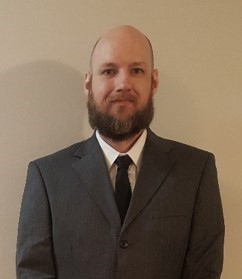
| Dr. Matthew Bryan, Postdoctoral Research Associate Oak Ridge National Laboratory Dr. Matthew Bryan received his Ph.D. in Physics from Indiana University, Bloomington, IN in 2018. He has a B.S. degree in Physics from University of Minnesota, Minneapolis, MN. His research background includes using a variety of inelastic neutron and X-ray scattering techniques to measure bulk liquid helium and the liquid in mesoporous confinement. These measurements include the excitation lifetimes, dispersion, momentum distribution, density of states and liquid structure. Within TETI, Dr. Bryan is studying the phonon density of states, dispersion, and lifetimes with inelastic scattering. In conjunction with transport measurements and simulation results, the inelastic neutron scattering results will further the understanding of the transport and thermodynamic properties of 5f-electron materials.
| | 
| Maniesha Singh, Graduate Student Purdue University Maniesha Singh is a second-year graduate student (Ph.D. candidate) working with Prof. Anter El-Azab at Purdue University. She received her MEng. degree in Materials Science with Nuclear Engineering from Imperial College London in 2018. Her research focuses on the computational modelling of defect disorder in advanced nuclear fuels. Her current work focuses on investigating the off-stoichiometry of unirradiated thorium dioxide and (U,Th) oxide and on developing a cluster dynamics model to model the evolution of defect clusters in irradiated oxides subjected to different dose rates and temperatures.
| |
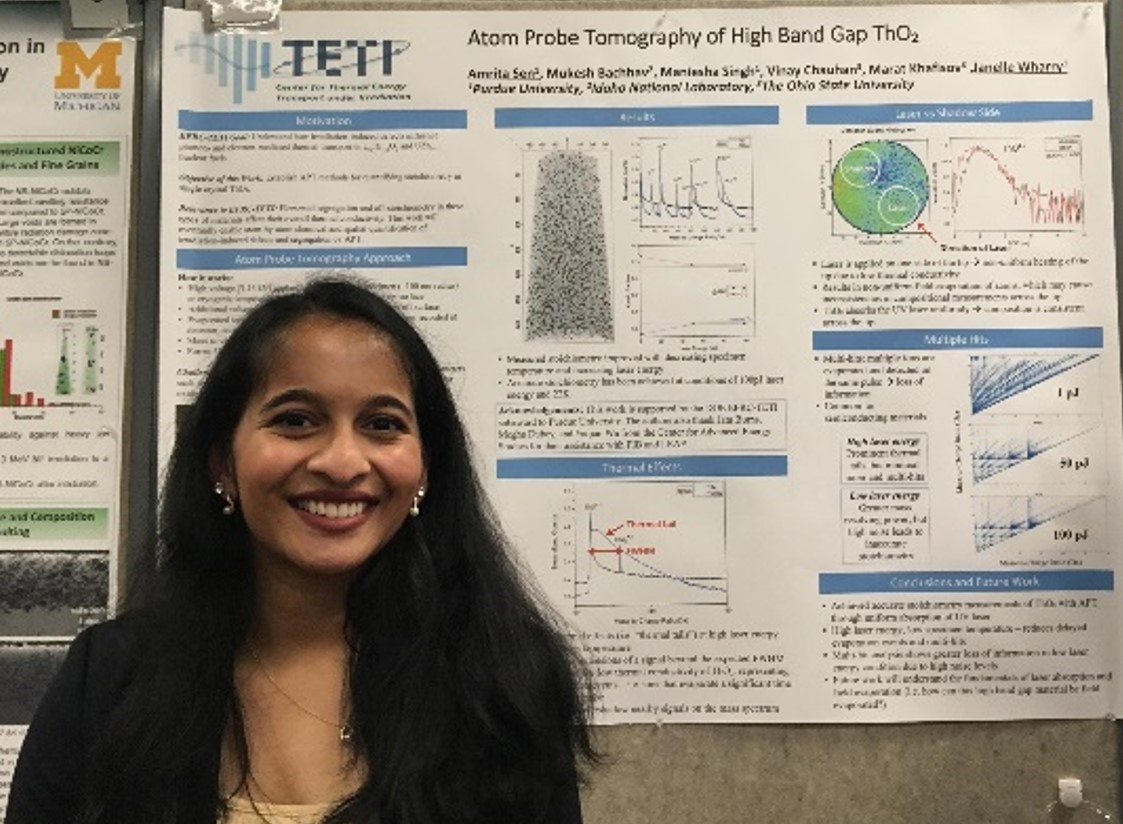
| Amrita Sen, Graduate Student Purdue University Amrita Sen is a Materials Engineering Ph.D. graduate student at Purdue University working under the guidance of Dr. Janelle Wharry. She received her B.S. of Physics from The University of Texas at Austin in 2018. Within TETI, her research focuses on using Atom Probe Tomography (APT) to chemically and spatially quantify irradiation-induced defects and segregation in UxTh1-xO2 and UZr2-x nuclear fuels at the near atomic level. She is currently working on establishing optimal APT conditions for obtaining accurate stoichiometry in ThO2 and looking at compositional variation within δ-UZr2.6.
| | 
| Vinay Chauhan, Graduate Student The Ohio State University Vinay Chauhan is a graduate student working with Prof. Marat Khafizov at The Ohio State University. He holds an M.S. degree (2018) from Ohio State and B.S. from BITS, Pilani (India), both in Mechanical Engineering. His research primarily focuses on developing and using laser based techniques for investigation of thermal transport at the micro- and nano-scale. The overall goal of his research is to develop more efficient and effective thermal management solutions for functional components of devices in electronics and energy applications. Within TETI, Vinay is studying the effect of ion-irradiation on thermal transport in sapphire, cerium dioxide and thorium diooxide. His work focuses on understanding the impact of phonon scattering mechanisms due to nano-channels, point defects, dislocation loops and other short- and long-range defects. His role also includes conducting laser based thermoreflectance experiments for measurement of thermal conductivity of thin films or irradiated samples.
| |

| Lyuwen Fu, Graduate Student Columbia University Lyuwen Fu is a Ph.D. candidate in Materials Science in Dr. Chris Marianetti's group at Columbia University. Lyuwen's research focuses on phonons and their interactions and materials properties derived from phonon interactions, including development of algorithms for such problems. These algorithms can be applied to various material systems and first-principle computations.
| |
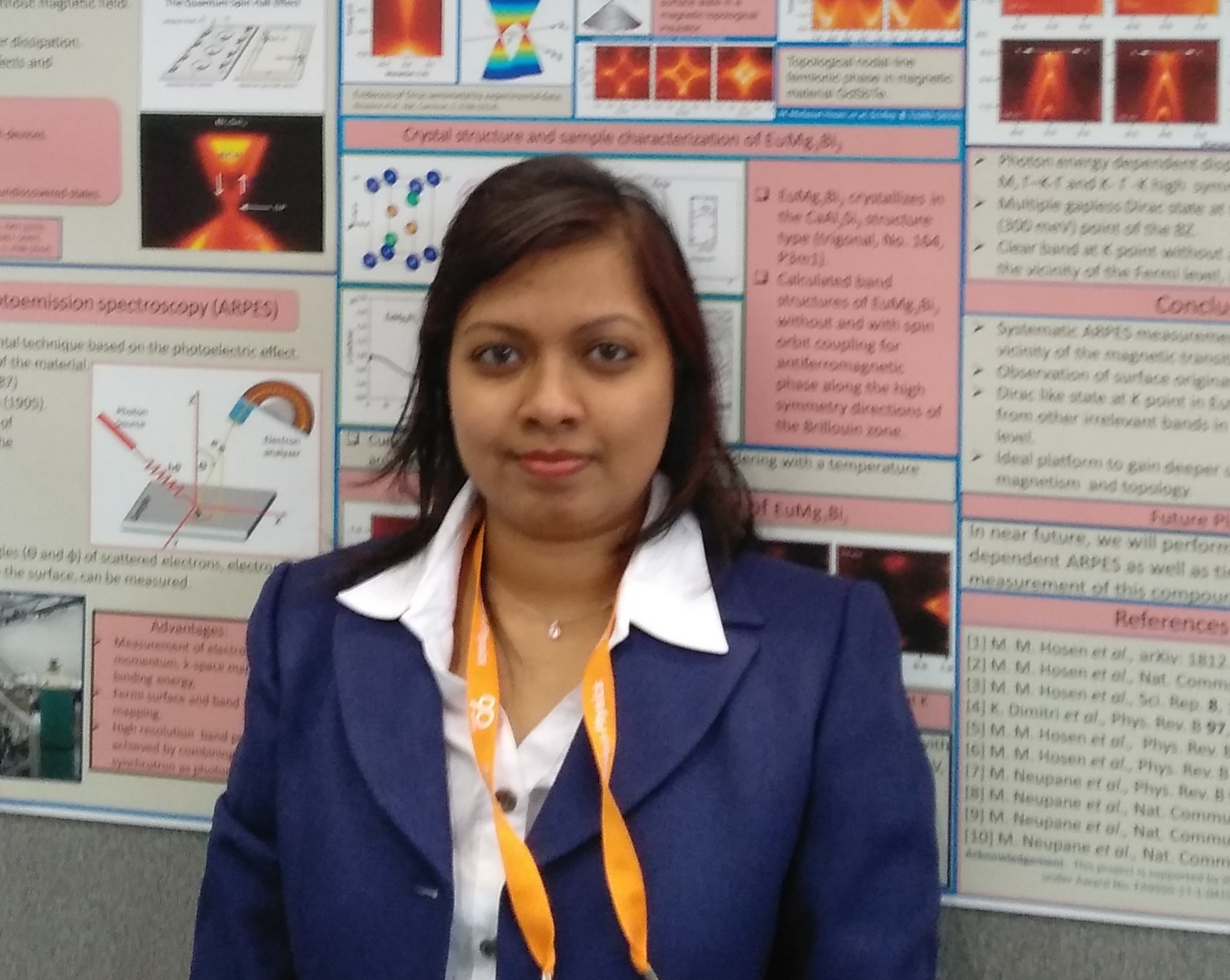
| Dr. Firoza Kabir, Postdoctoral Research Associate Idaho National Laboratory Firoza Kabir is pursuing her Ph.D. in Physics from the University of
Central Florida. She is currently a 3rd year graduate student working with her
advisor Dr. Madhab Neupane. Her research exploits angle and time-resolved
photoemission measurement techniques to unveil momentum-resolved properties of
quantum materials with compelling electronic and spin properties. More
specifically, her research focuses on advanced spectroscopic characterization
of topological, quantum and correlated materials. Firoza has also worked
on the thermal, magnetization and transport measurement of quantum materials as
a summer intern at the Idaho National Laboratory.
| |
|


